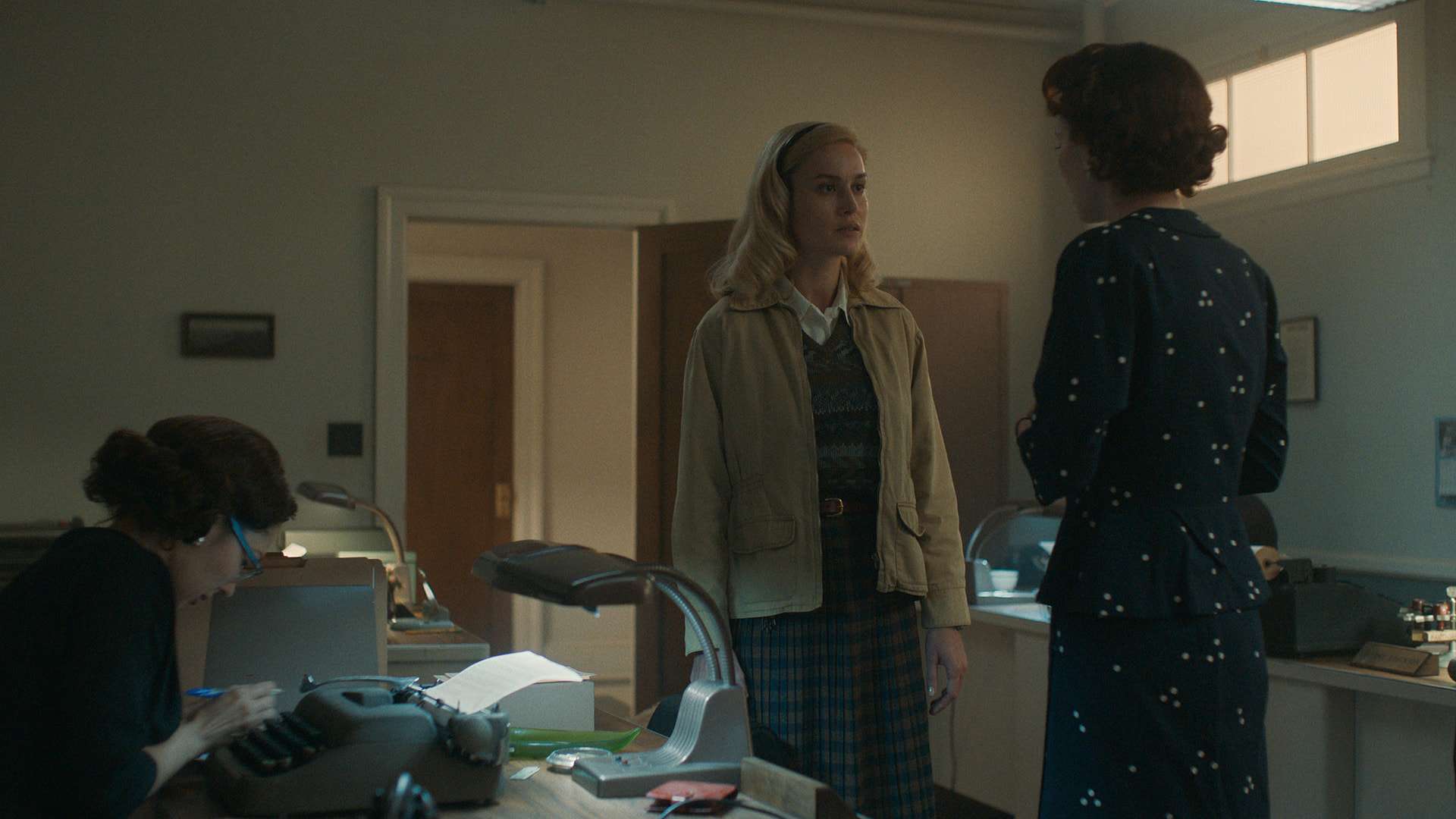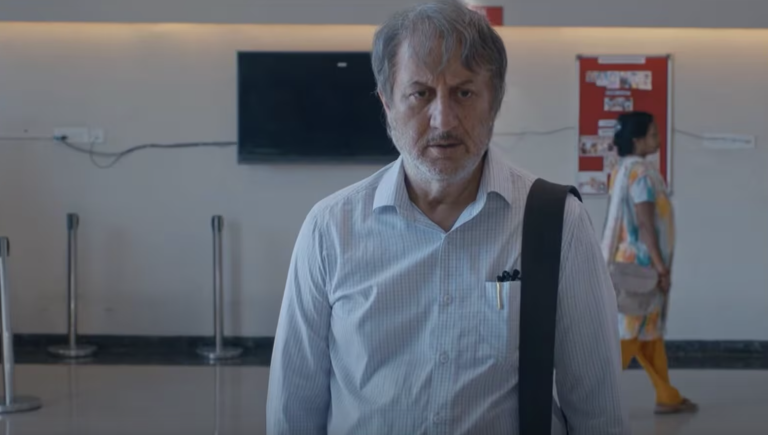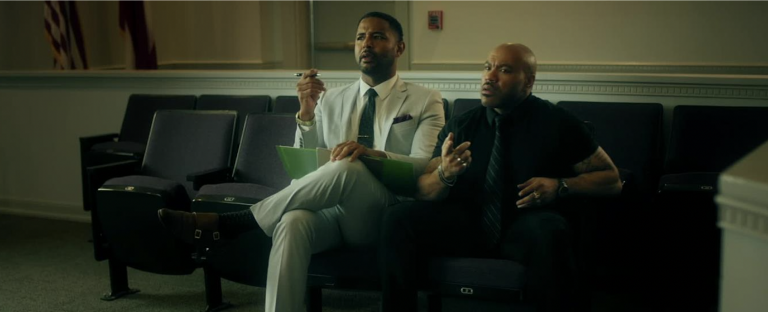If we, as viewers, thought that the last episode’s ending was shocking, how this week’s episode begins is nothing short of jarring. Lessons in Chemistry is trying its hardest to put curveballs structurally in a well-worn narrative, and as shown in Lessons in Chemistry (Season 1) Episode 3, a narrative progression is very much expected. The exploration of Elizabeth Zott (Brie Larson) as she grapples with her grief over losing Calvin Evans (Lewis Pullman) is a welcome one for ensuring emotional resonance, but the narration to be done by the voiceover of the dog Six-Thirty (BJ Novak) is a strange changeover.
Lessons in Chemistry (Season 1) Episode 3 “Living Dead Things” Recap:
The episode opens with a voiceover revealing that Six-Thirty (BJ Novak) was an army-recruited canine, but unlike his peers in the army, he is a coward who recoils from explosions or walks willingly into dangerous situations, as he is supposed to do. Six-Thirty reveals how one day, he escapes the army barracks, and while rummaging around the dustbin behind one of the houses, he meets the two people who helped him realize his potential – Elizabeth and Calvin. He loved them so much that his instinct to protect them overrode his cowardice. Or so he thought, as he had been afraid to cross the road that had caused Calvin Evans’s death.
The majority of the episode deals with the fallout following Evans’s death. While Evans’s personal belongings that had been with him when he died had been delivered to Elizabeth by the cops who had discovered his body, the rest of his belongings at the lab, along with his research, were all sent to storage. We learn that later. All the while, we see Elizabeth in a daze, Six-Thirty following her dutifully as she attends Evans’s service. There she even swatted away questions from a reporter of The Times who wanted to know some juicy details regarding Evans and his brusque nature and whether he had any family. And because Elizabeth is wracked with sorrow, she understandably doesn’t voice her answer well enough and says, “I didn’t know him well enough.” It is incredibly sad, made all the worse by Larson’s delivery. She is trying her hardest to maintain the deadpan while her eyes betray her sorrow as well as her strength.
Six-Thirty’s perspective hammers home the passive sorrow the dog is imbibing via osmosis. He remarks how she doesn’t pet him or doesn’t say a nice word to him, and all the while, he becomes wracked with guilt. As Six-Thirty accompanies Elizabeth back to the lab, both of them are shocked to see that the lab has been cleaned, and as Six-Thirty remarks, he couldn’t smell Evans; he couldn’t smell anything in the laboratory. Elizabeth goes to Fran, who is shocked to see her back at work, and when she asks about their research, Fran informs her that they are all sent to storage. Without directly refusing her, Fran states that the research belongs to Hastings University, and thus, Elizabeth has no claim on it. Similarly, she doesn’t have a claim on Evans’s personal belongings because, while Fran is aware of the “unusual” relationship between her and Calvin, they don’t understand a live-in relationship; they are waiting to see if a blood relative would come and claim Evans’s belongings. Fran, however, promises to set Elizabeth up with work at the admin wing, as she can’t work at a lab without the actual support of a chemist. She will have to leave the dog at home, though.
Every morning, Elizabeth would leave food for Six-Thirty, having designed a contraption that would drop the food to his bowl at that exact time. She would also leave the TV on, but it never completely assuaged Six-Thirty’s fear that she might leave him and never come back. He, however, had also been relieved because, like Elizabeth, he didn’t have to face what he believed to be his fault.
While Elizabeth is stuck in assisting the head of the admin wing in writing a complaint about the week’s crossword puzzle, Dr. Donatti manages to convince, in a rather ghoulish move, the head of the Remsen foundation that he had been Evans’s labmate and he should be given an extension of the grant such that he could continue Evans’ work. To add insult to injury, not only is his proposal accepted, but Donatti also brings in Evans and Zott’s research papers and ropes in Dr. Boryewitz, one of Zott’s acquaintances, to work on it. While Boryewitz was initially hesitant, he was finally convinced by Donatti because otherwise, Evans’s work would go to waste, and he would rather be Boryewitz than anyone else.
Meanwhile, that night, Elizabeth had made a pie and had mistakenly set a table for two. Upon realizing her mistake, she angrily uses a fork and eats a bite, only to vomit it upon feeling sick. When the sickness doesn’t subside, and she retches and vomits again at night, Elizabeth starts to be suspicious that she might have missed her period. However, since it is the 1950s, there isn’t any feasible way to be sure as of yet. So, she decides to make use of the amphibian ovulation test, commonly known as the frog test. It seems to be Elizabeth’s Hogben Test, whereby a sample of the woman’s urine is injected into the skin on the back of the frog, specifically the dorsal sac. Around 12 hours later, if the frog is found to be ovulating, a small cluster of eggs could be seen at the rear end of the frog, which would prove the presence of HCG (Human Chorionic Gonadotropin), which is found in pregnant women.
Zott thus “borrows” a frog from the oocyte lab, pretending to be on an errand to borrow samples from the pharmacology lab. She then injects urine into one frog as part of the experiment while another frog is used as a reference. Utilizing Evans’s cracked stopwatch, she waits for the timer to count down while nervously cutting vegetables and trying to cook dinner. When the result finally arrives, she sees sacs of eggs on top of the reference frog, proving her hunch correct. Six-thirty, on the other hand, says that he already knew the baby was coming long before she did, but instead of this being a new beginning for them, it led to an eve of destruction. Elizabeth, frustrated beyond measure, brought a sledgehammer and began to smash the mantlepiece. She is interrupted by a knock on the door as she meets a startled Harriet, who finally gets the chance to interact with the mysterious woman in Calvin’s life who is currently building “an industrial-grade chemical lab.” However, Harriet has come to meet her to inform her about the “journalistically irresponsible” reportage being done on Calvin, and while Zott rephrases that Calvin didn’t care what anyone thought of him, Sloane believes that this is recorded history and the story must be set straight.

It doesn’t happen, however, because as Sloane meets the reporter the next day, he understandably expresses sorrow over the loss of her friend but also explains that his story couldn’t be sold without an added spice. Sloane, perhaps, to not let this day go entirely wasted, convinces the reporter of much important news to be covered for the Times. Thus, the next day, we see him at the courthouse, covering the grilling Harriet is giving the Beverly Home Owners’ Association for passing the law that would have allowed for the flyover to go through that neighborhood, displacing Harriet and her neighbors.
Meanwhile, Zott asks Boryewitz at lunchtime to convince Laurel, his girlfriend, who works at the storage department, to grease the palms and bring up Evans’s personal belongings and their research to her. While Boryewitz is very sympathetic to her plight, he doesn’t reveal to her that Donatt and Boryewitz are working at Calvin’s old lab during off-hours to reproduce their nucleotide experiment step-by-step. But as it turns out, they are unable to, either because they can’t get the temperature or the speed of centrifugation right or, as Boryewitz points out, “they might be missing something.”
The next night, Boryewitz visits Zott and brings her Calvin’s personal items that had been locked in storage. But like the ghoul, his mentor is Boryewitz, who straight-up lies to Zott by stating that he did not see her research in the storage room. Zott, with no inkling about that lie, thanks Boryewitz and once he goes, opens up the cardboard box. She first finds the ball, which Six-Thirty immediately takes from her hand and starts gnawing. Then she finds a jazz album with a Post-it addressed to Harriet, apologizing to her and saying he would be present for the next one.
Elizabeth visited Harriet to give her the recording that Calvin wanted her to have as an apology. As the two slowly play the record while bonding over a bottle of wine, Harriet reveals how she is mad at herself for being mad at him the last time they talked. She remembers how she hadn’t even seen Calvin the first time he had moved in but remembered a Chet Baker record playing on the speakers and being mildly impressed, thus being very surprised at the lily-white man who had introduced himself as her neighbor. As Elizabeth and Harriet bond over Calvin’s eccentricities, Elizabeth opens up about her pregnancy when asked about the destruction she is exacting in her kitchen. She is scared, and Harriet assuages her, stating that no one believes they can do it, but then the woman expands and does it anyway because that’s what a mother does.
As if taking this advice as a mantra, Elizabeth gets into a rigorous routine. Every morning at 6:30, she wakes up, does intensive rowing exercises, writes her research paper, tenderizes meat to stave off her frustration, rinses, and repeats. One day at the toilet, while struggling to fit in her dress, Fran walks out of the bathroom and realizes her pregnancy. Elizabeth, blissfully unaware, goes to Dr. Mason, a gynecologist and Calvin’s rowing colleague. He gives her a clean bill of health and even expresses how her intense exercise regimen will actually help her in the long run while also telling her that he expects her to join their rowing club very soon.
Lessons in Chemistry (Season 1) Episode 3 “Living Dead Things” Ending Explained:
The final confrontation occurs at Dr. Donatti’s office, where he, presumably under Fran’s advice, tries to rusticate her from the department because of her pregnancy and also the “embarrassment” due to having been out of wedlock. Zott finally snaps and asks if the shoe was on the other foot, would Calvin be fired as well? Donatti, in typical fashion, replies that of course he wouldn’t, but she should be fired because she is the woman “who got knocked up.” When she retorts by stating that there are no rules for this, his response to it being an unwritten rule is met with a furious rebuttal of it not being legally binding. But Donatti then has the gall to state that Evans would be ashamed of her when, in reality, he wouldn’t be. In fact, he would be proud of her for standing up and walking out of that office like she does.
Later, she meets with Harriet while both of them are crossing the street to meet each other: Elizabeth borrows an axe to destroy the mantlepiece, while Harriet informs them how the paper had published an article about how she had visibly made the regulatory body squirm in their seats at the meeting. She reveals that when she had asked the reporter to come to the courthouse, she had felt Evans’s presence. She then advises Zott that, despite the feelings she is refusing to confront, she must move on. The ending sequence in the episode is a beautiful one of reconciliation, where she manages to have closure with Six-Thirty by participating in a run like Calvin because when you are unable to move forward, the best way is to just put one foot in front of the other and just move.









